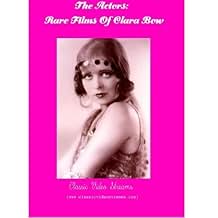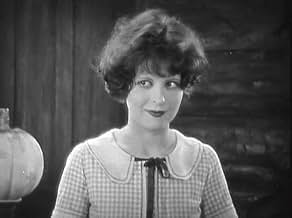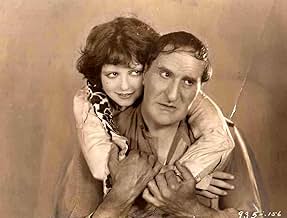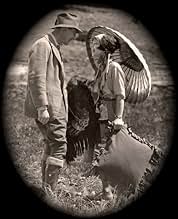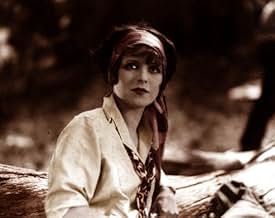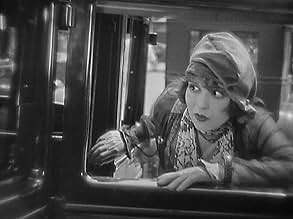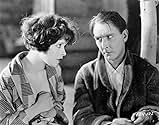A sexy young manicurist living with her older backwoodsman husband in a small Canadian town finds herself attracted to a young, rich and famous divorce lawyer who comes to town on vacation.A sexy young manicurist living with her older backwoodsman husband in a small Canadian town finds herself attracted to a young, rich and famous divorce lawyer who comes to town on vacation.A sexy young manicurist living with her older backwoodsman husband in a small Canadian town finds herself attracted to a young, rich and famous divorce lawyer who comes to town on vacation.
- Awards
- 2 wins total
Chief John Big Tree
- Indian
- (uncredited)
Scotty Mattraw
- Man gets haircut
- (uncredited)
Rolfe Sedan
- Barber
- (uncredited)
Featured reviews
Mantrap (1926)
*** (out of 4)
Romantic comedy about city girl Alverna (Clara Bow) who agrees to marry the woodsman Joe Easter (Ernest Torrence) just because he's different. She moves with him to the small town of Mantrap where she eventually meets a lawyer (Percy Marmont) on vacation and soon the two decide to run off. MANTRAP isn't a masterpiece in regards to its storytelling but there's no question that the entire cast is extremely good and help keep this thing entertaining. I think the weakest part of the story is the actual screenplay, which just isn't all that believable and especially the stuff dealing with the beautiful Alverna falling for someone like Joe. It's made quite clear throughout the picture that she's a major flirt so you really do have to wonder why she would settle on Joe. Still, this here really doesn't kill the film as the three leads are simply so good that you can overlook this flaw. Director Victor Fleming does an extremely good job with the lighter touches of humor and especially an entire sequence in the woods when the three characters come together again. This here happens towards the end of the picture but it's one of the best moments in the film. Torrence is extremely likable in his part of the rough looking man who lives in the woods. I thought he really brought a lot of joy to the character and you couldn't help but love him. Marmont is a bit stiff but this is a good way to play the character since he's the complete opposite of Joe. Eugene Palette is also extremely good in his few scenes. There's no question that the real star is Bow. She's so bubbly and energetic that she pops right off the screen and you can't help but find joy in her. There's also no question that she brings that sexy nature to the role and she also shows some pretty good comic timing and especially when she's constantly fixing herself up to try and get something off of whatever man is around here. MANTRAP isn't a complete success but fans of Bow or those just wanting to see what her sex appeal was all about will get plenty of it here.
*** (out of 4)
Romantic comedy about city girl Alverna (Clara Bow) who agrees to marry the woodsman Joe Easter (Ernest Torrence) just because he's different. She moves with him to the small town of Mantrap where she eventually meets a lawyer (Percy Marmont) on vacation and soon the two decide to run off. MANTRAP isn't a masterpiece in regards to its storytelling but there's no question that the entire cast is extremely good and help keep this thing entertaining. I think the weakest part of the story is the actual screenplay, which just isn't all that believable and especially the stuff dealing with the beautiful Alverna falling for someone like Joe. It's made quite clear throughout the picture that she's a major flirt so you really do have to wonder why she would settle on Joe. Still, this here really doesn't kill the film as the three leads are simply so good that you can overlook this flaw. Director Victor Fleming does an extremely good job with the lighter touches of humor and especially an entire sequence in the woods when the three characters come together again. This here happens towards the end of the picture but it's one of the best moments in the film. Torrence is extremely likable in his part of the rough looking man who lives in the woods. I thought he really brought a lot of joy to the character and you couldn't help but love him. Marmont is a bit stiff but this is a good way to play the character since he's the complete opposite of Joe. Eugene Palette is also extremely good in his few scenes. There's no question that the real star is Bow. She's so bubbly and energetic that she pops right off the screen and you can't help but find joy in her. There's also no question that she brings that sexy nature to the role and she also shows some pretty good comic timing and especially when she's constantly fixing herself up to try and get something off of whatever man is around here. MANTRAP isn't a complete success but fans of Bow or those just wanting to see what her sex appeal was all about will get plenty of it here.
Of all those long-gone silent movie stars, Clara Bow is one of the few whose name is widely remembered. She is seen as epitomising the Jazz-age floozy; fun-loving and promiscuous in that brief period when these things weren't frowned upon in the movies. Actually Bow played a lot of relatively tame leading lady roles as well – it was her offscreen antics that garnered her reputation. But once in a while she played a role that lived up to the stereotype, as in the bluntly-titled Mantrap.
Mantrap shows Clara at her most lively, playing her effortless flirtatiousness to the hilt. As this is also a comedy she gets to exaggerate a little, proving to be very good at this – humorous, but not overly theatrical. Playing opposite her is the Ernest Torrence, who because of his size and looks was generally cast as villains. He does well against type here though, showing a kind of awkward sensitivity towards Bow. Also to be seen here is Eugene Palette, his tubby sidekick persona just beginning to emerge (although it wouldn't really solidify until the coming of sound added his voice to the mix).
The director was Victor Fleming, one of many action-loving young men working in Hollywood at the time. For Fleming, the image really has to keep moving, and he makes the action snappy with lots of tracking shots and pans round the room. Often this attention-grabbing style is very much functional. For example, he gives Percy Marmont ("Ralph") a very memorable introduction with his face suddenly revealed. This is necessary because he then disappears from the narrative for a while, only to re-emerge as a main character. He saves an absolutely brilliant entrance for Bow herself, having her appear from behind a curtain in the background and, as if incidentally, has her saunter forward until she is in close-up.
Despite what the title implies, Mantrap is a rather playful affair that shows the men in Clara's life as becoming exasperated rather than ensnared by her. It's remarkably even-handed though, and she gets to assert her independence in style. If you want to see the real vision of a 1920s femme fatale, you have to look at the dubiously moral pictures of Cecil B. DeMille. But coming at it from this different angle, Mantrap is more in the way of good-natured fun.
Mantrap shows Clara at her most lively, playing her effortless flirtatiousness to the hilt. As this is also a comedy she gets to exaggerate a little, proving to be very good at this – humorous, but not overly theatrical. Playing opposite her is the Ernest Torrence, who because of his size and looks was generally cast as villains. He does well against type here though, showing a kind of awkward sensitivity towards Bow. Also to be seen here is Eugene Palette, his tubby sidekick persona just beginning to emerge (although it wouldn't really solidify until the coming of sound added his voice to the mix).
The director was Victor Fleming, one of many action-loving young men working in Hollywood at the time. For Fleming, the image really has to keep moving, and he makes the action snappy with lots of tracking shots and pans round the room. Often this attention-grabbing style is very much functional. For example, he gives Percy Marmont ("Ralph") a very memorable introduction with his face suddenly revealed. This is necessary because he then disappears from the narrative for a while, only to re-emerge as a main character. He saves an absolutely brilliant entrance for Bow herself, having her appear from behind a curtain in the background and, as if incidentally, has her saunter forward until she is in close-up.
Despite what the title implies, Mantrap is a rather playful affair that shows the men in Clara's life as becoming exasperated rather than ensnared by her. It's remarkably even-handed though, and she gets to assert her independence in style. If you want to see the real vision of a 1920s femme fatale, you have to look at the dubiously moral pictures of Cecil B. DeMille. But coming at it from this different angle, Mantrap is more in the way of good-natured fun.
I've had the privilege of seeing a dozen or so of Miss Bow's movies and I would rate this one among the best, after IT. I'm surprised that the current rating is only a 6.6. Clara never looked better than in MANTRAP and was approaching the peak in her career. The soon to be "It" girl, is so vibrant, uninhibited, and full of life as Alverna, the young manicurist from Minneapolis who impulsively marries an older he-man, Joe Easter, from the back country and becomes restless once they return to Mantrap. Poor Ralph Prescott, a divorce lawyer from New York who is at his breaking point from all his flirtatious female clients, decides to take a vacation to get away from everything at the insistence of his friend. Not only does he get wrestled to the ground by his heavy-set friend, played by Eugene Pallate, once they get on each other's nerves, but he gets accepts an invitation to stay at Joe's cabin to get away from living in a tent. Little does he know, that the seductive Alverna awaits him ready to flirt with him every time Joe's back is turned. I think this is a very entertaining romantic comedy from the mid 1920s. Both Ernest Torrence and Percy Marmont, as well as any red-blooded male watching the movie, fall prey to Clara's mischievous grin and beautiful, expressive eyes. I'm so glad that Paramount didn't let this one deteriorate in its vaults. 8/10
I'd been wanting to see Mantrap for years and finally got the chance to see it recently. What a rare treat -- being able to see Clara Bow in one of her early hits, aided by A-list talent such as director Victor Fleming and cinematographer James Wong Howe, with a snappy script based on original material by Sinclair Lewis. If you're a fan of Miss Bow, it's worth it to seek out this title -- she really shines here! You will not be disappointed.
From the moment she enters the scene as Alverna, a bubbly doll of a manicurist with a severe flirting problem, she steals every scene she's in. Alverna falls for Joe, a simple backwoods "he-man" who quickly makes her his bride and snatches her away to his rustic cabin up north. Take Alverna's boredom and flirting addiction, add in Ralph, a New York divorce lawyer running away from city women ... and you can see where the story is headed. But it's oh so much fun to watch it unfold.
Clara's manic energy makes the movie (watch the scene in which she feeds Joe and Ralph chocolates and bops around the room like a sexy little Muppet), but the dialogue on the title cards keep the comedic energy up as well with clever quips. When Joe threatens to send Alvy away to his aunt in Minneapolis, she retorts: "Minneapple - sauce!" A great slice of mid-1920s vernacular, and this movie's full of them.
Unfortunately, B.P. Schulberg at Paramount threw Clara into practically any picture that came along, which means she racked up dozens of roles in mediocre, forgettable titles in her day. (The reason is clear: Clara had such -- well, "it" -- that she would have been watchable in a film about drying paint. So why seek out top material when your star makes you money even when the material is crap?) Mantrap is the kind of vehicle Clara should have always been given. An adorable little film, a wonderful showcase for Clara, and a silent I highly recommend.
From the moment she enters the scene as Alverna, a bubbly doll of a manicurist with a severe flirting problem, she steals every scene she's in. Alverna falls for Joe, a simple backwoods "he-man" who quickly makes her his bride and snatches her away to his rustic cabin up north. Take Alverna's boredom and flirting addiction, add in Ralph, a New York divorce lawyer running away from city women ... and you can see where the story is headed. But it's oh so much fun to watch it unfold.
Clara's manic energy makes the movie (watch the scene in which she feeds Joe and Ralph chocolates and bops around the room like a sexy little Muppet), but the dialogue on the title cards keep the comedic energy up as well with clever quips. When Joe threatens to send Alvy away to his aunt in Minneapolis, she retorts: "Minneapple - sauce!" A great slice of mid-1920s vernacular, and this movie's full of them.
Unfortunately, B.P. Schulberg at Paramount threw Clara into practically any picture that came along, which means she racked up dozens of roles in mediocre, forgettable titles in her day. (The reason is clear: Clara had such -- well, "it" -- that she would have been watchable in a film about drying paint. So why seek out top material when your star makes you money even when the material is crap?) Mantrap is the kind of vehicle Clara should have always been given. An adorable little film, a wonderful showcase for Clara, and a silent I highly recommend.
Clara Bow's favorite among her own films is, when seen today, an agreeable if inconsequential silent comedy showing the 'It' Girl in familiar form, impulsively marrying an honest but unexciting mountain man (Ernest Torrance) and soon becoming bored with the great outdoors. Her inability to resist any sort of flirtation leads to a dalliance with prim misogynist Percy Marmont, in the hope that he might return her to civilization. But despite a promising set-up the level of humor is almost too modest, content to provide the occasional lighthearted chuckle instead of the more satisfying belly laugh. Bow's natural vitality and charm carry the film, and the impressive location photography was provided by a fledgling James Wong Howe.
Did you know
- TriviaThis was the first time Victor Fleming directed Clara Bow, and apparently the experience was a pleasant one--he began a long-term personal relationship with her.
- GoofsIn the montage of Joe's trip from Mantrap in Canada to Minneapolis, palm trees can be seen behind some of the houses.
- Quotes
Joe Easter: Well, that sort of upsets my plans. I'd figured on sendin' her to my aunt in Minneapolis...
Alverna: Minneapple sauce!
- ConnectionsFeatured in Hollywood (1980)
Details
- Runtime
- 1h 11m(71 min)
- Color
- Sound mix
- Aspect ratio
- 1.33 : 1
Contribute to this page
Suggest an edit or add missing content

